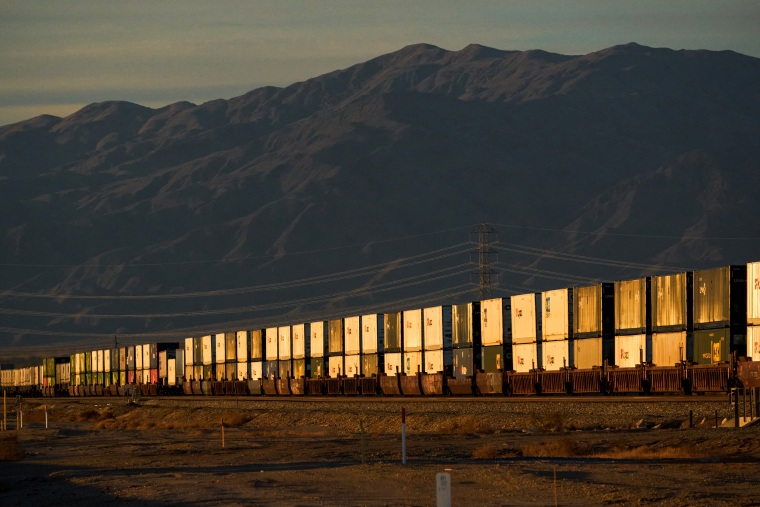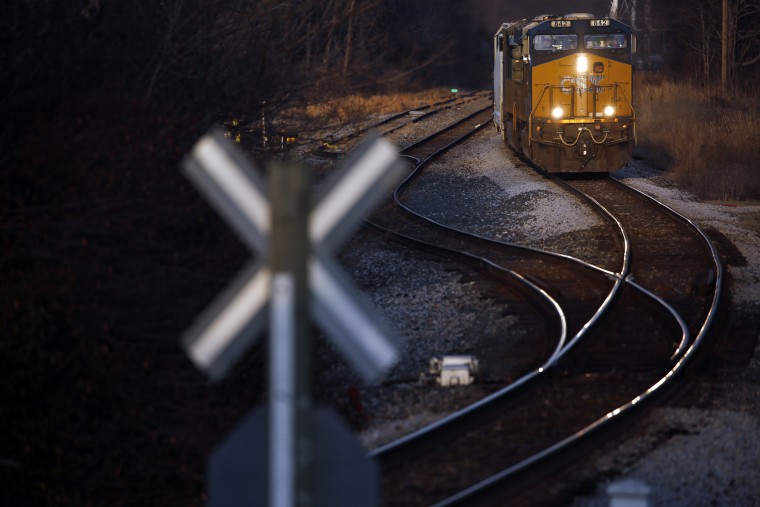
The White House struck a tentative deal Thursday to avoid a rail strike that risked major disruptions across the United States, with freight workers securing a key demand.
The agreement between major freight rail operators and two large unions — the Brotherhood of Locomotive Engineers and Trainmen and SMART Transportation Division — highlights the labor movement’s growing influence under an administration that has cast itself as a staunch ally of labor. Their tentative pact drew a collective sigh of relief from business groups that had warned a stoppage would cause crippling economic damage.
“This agreement is a big win for America,” President Joe Biden said Thursday at the White House, thanking negotiators for the unions and the rail carriers, after what he said were 20 hours of marathon talks ahead of a looming Friday deadline.
For the president and fellow Democrats, the deal offers a measure of political relief after fears that the economic fallout from a strike could further squeeze households hit by stubbornly high inflation.

“This is a win for tens of thousands of rail workers and for their dignity,” Biden said, adding that the deal would also boost rail operators’ ability to hire and retain workers, and called the carriers a vital “backbone” of the economy.
Joseph Hinrichs, the incoming CEO of rail company CSX, said the employees are “deserving of these raises they’re getting,” speaking on CNBC Thursday. “They’ve been through the pandemic and through all of the work they’ve done for us,” said Hinrichs, who was not directly involved in the talks. (CNBC and NBC News are both part of NBCUniversal.)
Pandemic pressures, including those that scrambled supply chains, worked in freight workers’ favor, logistics experts said.
“Railroad employees feel they have a strong hand to play now, and they’re playing it,” said Zac Rogers, assistant professor of operations and supply chain management at Colorado State University. “They have been worked to the bone for the last two years trying to deal with Covid and its aftershocks,” he said, adding that the general public has “never been more aware of the importance of supply chain” just as some longstanding bottlenecks show signs of easing.
A rail strike would dent many industries, as about 40% of goods that are shipped long-distance rely on the nation’s rail system. Agriculture, automotive, chemical, packaging and industrial parts makers would take the biggest hits, according to Glenn Koepke, general manager of network collaboration at the supply-chain management platform FourKites.
Even though a strike has been forestalled, Koepke said that shippers looking for contingency plans were already driving up demand for trucking. “Rates will spike through the end of the week and have been as high as 25%, but they will return to stable levels next week,” he said.
On Thursday, a broad range of industry groups applauded the tentative deal and urged its approval.
“The Biden administration’s efforts to avoid a strike will keep ingredients, inputs, commodities and finished products moving,” the Consumer Brands Association, which represents major grocery-store staples, said in a statement. Trade organizations for everything from baked goods to chemicals and even sneakers also welcomed the agreement.
“If a deal is not completed in full,” the American Apparel and Footwear Association said in a statement, “the 25% of apparel and footwear that typically touches the rail lines would immediately get stuck and threaten the busy fall shopping season.”
After canceling long-distance routes pre-emptively Wednesday, Amtrak said Thursday that it was “reaching out to impacted customers to accommodate on first available departures.” Midwest commuter rail carrier Metra said trains that were set to be canceled by BNSF and Union Pacific would now run as scheduled Thursday evening.

The pact next goes to a vote among members of BLET and SMART-TD, the nation’s two largest freight unions, which represent 57,000 conductors and engineers who staff most trains in two-person teams.
Under terms of the deal, employees will for the first time be able to take unpaid time off work for routine preventive medical care, union leaders said in a statement. There will also be exemptions from attendance policies for hospitalizations and surgical procedures, and workers will gain an additional paid personal day each year without fear of discipline.
Before Wednesday’s marathon talks, rail operators had already agreed to compensation changes including a 24% compound wage increase over the deal’s five-year term and an annual lump-sum bonus payment totaling $5,000. But a key sticking point remained: attendance policies that workers said made taking planned days off nearly impossible.
Rail workers often are on-call 24/7 year-round and are allotted time off only after being called to a number of consecutive on-call shifts. Unplanned issues like doctor’s appointments have sometimes put workers on disciplinary paths, which can lead to dismissal. A labor union source told NBC News that getting rail carriers to negotiate on attendance policies was a major breakthrough.
BLET and SMART-TD hailed the tentative deal in a joint statement Thursday. “The solidarity shown by our members, essential workers to this economy who keep America’s freight trains moving, made the difference in our Unions obtaining agreement provisions that exceeded the recommendations” of federal mediators earlier this summer, they said.
If rank-and-file union members vote down the plan, it won’t take effect and they could find themselves back in negotiations. The agreement includes a “cooling off” period of several weeks to ensure that no immediate rail shutdown would occur if a vote fails.
Railroads have cut their labor forces in recent years, running trains with even fewer personnel and exacerbating the burden on workers, while company profit margins have risen significantly.
The two biggest freight rail companies saw record profits during 2021: BNSF had a net income of nearly $6 billion, and Union Pacific’s hit $6.5 billion. CSX achieved a record low operating ratio — a key industry measure of the share of revenue eaten by expenses, including labor — for the third quarter, and Norfolk Southern Railway announced a record low operating ratio for 2021.
Earlier this summer, the Biden administration temporarily forestalled a strike after convening a three-person board to study the issue and freeze talks. The president has championed workers’ rights throughout his first two years in the White House, including by forming a task force to protect employees’ rights and moving to undo Trump-era rollbacks of labor protections. Unions have strongly supported Biden, despite some lamenting that he was unable to deliver on key promises last year.

 Latest Breaking News Online News Portal
Latest Breaking News Online News Portal




